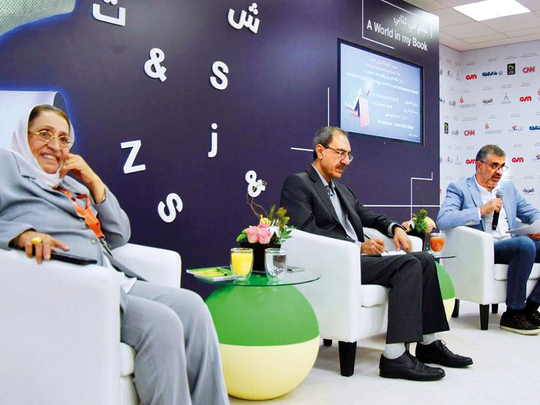
Sharjah: Rather than only speaking about the “deterioration of Arabic language” and the crisis facing it, societies should focus more on their role in spreading the love for the language, experts have said at the Sharjah International Book Fair (SIBF).
During a session titled ‘Current Arabic Language and its Contemporary Issues’, speakers said the common discourse about Arabic language has mostly been negative and around the troubles facing the language, without looking at the right solutions that will help in preserving it.
The biggest challenges they addressed were the spread of foreign languages, especially English and its dominance in general interactions and communication, the attitude of educators when teaching children the language and the complexity of words in which writers use in their books, which makes youth dislike the language.
Dr Thuraya Al Aasi’li, an Egyptian poet and critic, said societies should look at the future Arabic language from a more optimistic perspective.
“When we talk about the challenges facing our Arabic language, we deal with the subject with a lot of negativity, and we keep saying our language is dying, even though we are at a time where our language is flourishing in countries that do not speak Arabic. Many Arab communities in diaspora are keen to teach the language to their Arab children and rely mainly on the Holy Quran,” she said.
She called it a shared responsibility for those who care about Arabic language to think about the ways to lay its road to progress and help it survive.
“It is the responsibility of families, educational institutions and the media who should rely on it as a basic language for communication and encourage youth to learn and explore it. Our mother tongue is one of the most important elements of our identity,” she said.
Dr Al Aasi’li referred to teachers as the messengers and said they need to equip themselves with more skills and knowledge of the language.
“Those with sons, daughters, or neighbours need to set up their own libraries at home with engaging books and encourage people around them to read,” said Dr Al Aasi’li, who is also a member of Egypt’s writers’ association.
Dr Samah Idris, author and editor-in-chief of A’adab magazine, focused his discussion more on the different factors affecting people’s attitude towards the language. He said teachers need to be aware that they can sometimes put off students when trying to teach them Arabic.
“Educators can follow a patriarchal attitude and make it seem like it’s a crime if students pronounce a word wrong in Arabic or use a word in vernacular Arabic,” he said, noting that parents must notify the school and ask them to be more flexible when teaching the language.
Apart from teachers, he added, parents should avoid mixing up their children by speaking to them in two languages at the same time. “It’s important for parents to be good role models in front of their children by reading Arabic books or magazines in front of them.”
Dr Idris pointed out that writers have the tendency to also show off their Arabic proficiency by using “complicated terms” which end up pushing people to read in another language.
“As a writer, who writes books for children, I ensure the words being used are simple. The simpler and more flexible the words, the more the child will enjoy the experience of reading in Arabic,” he said, calling on writers to take into account the readership and use “simplified standard Arabic” when needed.
Concluding the session, Dr Al Aasi’li proposed that all Arab countries must come together to adopt a national project for learning Arabic that would unite the curriculums.








